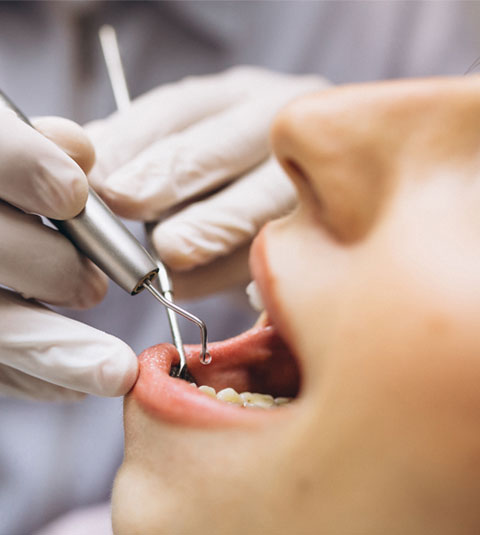- Call Today+91 9550029730
- Open Hour 09:00 AM to 20:30 PM
We like to say “prevention is better than a cure” and a professional clean is definitely a preventative measure of many oral health problems.
It is recommended that you visit the Dentist a minimum of 2 times a year. According to the Dental Association of Australia,
“dentists recommend a routine dental check-up every 6 months, but a cookie cutter approach does not necessarily work for everyone.”
We recommend a professional clean every 6 months for most people, but others with a high risk of gum disease or tooth decay may need
to visit the dentist every 3 months.
Smiles Unlimited offers complimentary checkups during weekdays. We are more than happy to assess your oral health for free because your smile is our passion. This will allow us to determine whether your mouth is healthy or if there are any issues we can address in later visits. Hence, checkups are important as they can help see if you’re healthy!
Your dentist should take a full set of dental X-rays early into the doctor-patient relationship. X-rays help your doctor monitor any changes that could be happening in your teeth between appointments. Most adult patients have bitewing X-rays every year. Our clinic provides in house X-Rays with our own X-Ray machine. This means you do not have to go to another X-Ray clinic. We can take the X-Ray during your first consultation visit. The full mouth (OPG) X-Ray is covered by Medicare.
FALSE! No rinsing is required! Spitting out and not rinsing leaves a protective layer of fluoride on your teeth. The same principle applies to mouth wash.
Dry mouth can be a symptom of many different problems and can happen as you get older. Quite often it is a side effect
of medication – especially heart, blood pressure, and depression tablets.
If you have a dry mouth, this can be very uncomfortable and it can make eating certain foods very difficult.
Many prescription medicines can cause a dry mouth, if you are taking any regular medication from your doctor, it may be worth discussing
these symptoms with him to see if there is an alternative that does not have the same side effects.
Visit Your Dentist: Start by scheduling an appointment with your dentist. They can determine the cause of your tooth sensitivity and provide
specific guidance based on your condition.
Desensitizing Toothpaste: Consider using desensitizing toothpaste, which contains compounds like potassium nitrate or fluoride.
These toothpaste varieties can help reduce tooth sensitivity over time when used regularly.
Change Your Toothbrush: Switch to a soft-bristle toothbrush if you're not already using one.
Hard-bristle brushes can be abrasive and worsen tooth sensitivity.
Brush Gently: Be mindful of your brushing technique. Brush your teeth gently in a circular motion rather than using
aggressive back-and-forth strokes. Avoid brushing immediately after consuming acidic foods or drinks.
Avoid Acidic Foods and Drinks: Limit your consumption of acidic foods and beverages, such as citrus fruits,
soda, and certain types of alcohol. Acid can erode tooth enamel, leading to increased sensitivity.
Brush Your Teeth: Brush your teeth at least twice a day, in the morning and before bedtime. Use a soft-bristle toothbrush
and fluoride toothpaste. Hold the brush at a 45-degree angle to your gums and brush gently in a circular motion to remove
plaque and food particles. Be thorough and spend at least two minutes brushing.
Floss Daily: Flossing is essential to remove food particles and plaque from between your teeth and along the gumline.
Make sure to be gentle to avoid damaging your gums.
Rinse with Mouthwash: Consider using an antimicrobial or fluoride mouthwash after brushing and flossing to kill
bacteria and strengthen your teeth. Follow the directions on the product label.
Clean Your Tongue: Gently brush your tongue or use a tongue scraper to remove bacteria and freshen your breath.
Choose a Balanced Diet: What you eat affects your oral health. Limit sugary and acidic foods and drinks, as they can lead
to tooth decay. Consume a diet rich in fruits, vegetables, whole grains, lean proteins, and low-fat dairy products.
Drink Water: Water helps to rinse away food particles and bacteria, and it's especially important after consuming sugary or acidic foods and drinks.
Regular Dental Checkups: While this isn't a home practice, it's crucial for maintaining good oral hygiene. Visit your dentist regularly for check-ups and professional cleanings.

© Sri Datta Dental Clinic. All rights reserved.